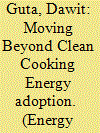| Srl | Item |
| 1 |
ID:
166510


|
|
|
|
|
| Summary/Abstract |
In West Africa, household energy transition has so far mainly been synonymous with the conversion from woodfuel to LPG. This paper analyses the failure of 30 years of household energy transition policies in Mali by combining two major frameworks: Multi-Level Perspective (MLP) and Social Practice Theory (SPT). Based on empirical field studies undertaken in Bamako since 1985 and on literature review, two historical narratives are presented, one focusing on the dynamics of the dominant woodfuel regime and the other on changes in cooking practices. The MLP analysis showed that all elements seemed aligned for destabilization of the dominant regime, yet the woodfuel regime has resisted and is maintained. The SPT analysis showed that the stability of cooking, eating and fuel purchasing practices did not converge towards and even opposed the transition to LPG. This paper shows that the MLP and SPT frameworks offer complementary perspectives for understanding transitions in developing countries. It concludes that the definition and implementation of energy policies need to integrate an analysis of daily practices and should consider that energy transition is not synonymous with the replacement of one fuel by another, but with new opportunities to diversify ways of cooking.
|
|
|
|
|
|
|
|
|
|
|
|
|
|
|
|
| 2 |
ID:
192734


|
|
|
|
|
| Summary/Abstract |
Household solid fuel use has adverse impacts on health and the environment. The Indian government's Pradhan Mantri Ujjwala Yojana (PMUY) subsidy promoted the adoption of Liquid Petroleum Gas (LPG) by millions of Indian households. There is little knowledge, however, regarding decision-making to reduce solid fuel use after adopting cleaner fuels. Leveraging panel data on household energy use in rural India we jointly estimated LPG adoption and consumption to study the reduction in solid fuel use. Our results indicate that exclusive LPG use increased from 4.5% to 17.8% between 2015 and 2018 while fuel stacking (use of multiple fuels) doubled from 18% to 39%. The household's wealth index, self-reported higher social strata, business ownership, head of household's educational level, and the proportion of LPG-using households in the village were positively associated with LPG consumption and suspension of solid fuels. Distance to LPG refill delivery, household size and PMUY subsidy were negatively associated with LPG share though LPG share was positively associated with the interaction of PMUY with wealth index. Policy efforts should target sustained LPG consumption by making refill delivery more accessible and implementing a pro-poor refill subsidy as well as general poverty alleviation (e.g., by creating income generation opportunities).
|
|
|
|
|
|
|
|
|
|
|
|
|
|
|
|